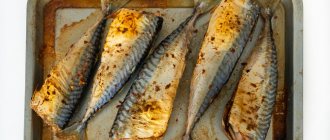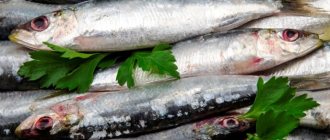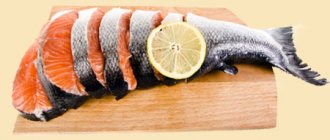Mackerel (or mackerel) is a tasty and healthy fish from the perch family, distributed throughout the world. It owes its popularity to its low cost, distinct taste characteristics and positive effect on health. Mackerel is prepared in different ways: boiled, salted (sometimes spicy salted/lightly salted), smoked, baked in the oven and even pickled. If you are watching your diet, you should learn about the benefits and harms of mackerel, as well as in what form and quantity it is recommended to eat it.
- What does mackerel contain?
- Types of fish and how healthy they are
- Benefits of mackerel when consumed
- How is fish beneficial for women, including pregnant women?
- The benefits of mackerel for men, athletes and children
- Harm of mackerel and contraindications for use
BZHU and chemical composition
Among fatty fish, mackerel has a moderate calorie content, which makes it an excellent dietary product. In terms of the nutritional value of mackerel, 100 g of fresh fish on average contains:
- proteins – 18 g;
- fats – 13.2 g;
- carbohydrates – 0 g.
The proteins contained in mackerel are easily digestible, which distinguishes it from other sources of protein: beef, pork, poultry. 200 g of mackerel per day is enough to satisfy the body's need for these organic substances. It is advisable to eat boiled mackerel - this way it retains all its beneficial properties.
Please note: in spring mackerel has only 3% fat content, and in autumn – as much as 30%. There is no need to be afraid of this figure - the high content of Omega fatty acids is extremely beneficial. Eating mackerel, from this point of view, is priceless - after all, our body does not know how to independently produce Omega-3 and Omega-6 fatty acids.
Mackerel contains B vitamins (B1, B2, B3 (PP), B5, B6, B7 (H), B9, B12), as well as vitamins A, C, D, E and K. It is rich in potassium, contains phosphorus, is a source of magnesium and sodium, as well as iron, calcium, chlorine and sulfur. Mackerel has a rich composition of microelements: zinc, manganese, iodine, copper, chromium, fluorine, molybdenum, cobalt, nickel. All of them are indispensable for maintaining health. The high content of nutrients makes mackerel a universal product for any diet, since it contains everything the body needs for normal functioning or development (when it comes to children).
Mackerel: content of nutrients
Mackerel is definitely a healthy fish. It contains microelements, macroelements and vitamins; it is especially recommended to prepare mackerel soup in order to preserve its beneficial qualities. All this useful composition strengthens the human immune system. Thus, the patient’s immunity is ready to fight any illness.
Chemical composition
Chemical composition of fish per 100 grams:
- Fats 13.3 gr.
- Proteins 19.gr.
- Water 67.5 gr.
- Cholesterol 71 mg.
- Fatty acids 4.3 g.
- Vitamin A 0.01 mg.
- Vitamin B1 0.12.mg.
- B2 0.37.µg
- B5 0.9.mcg
- B6 0.8.mcg
- B9 9 mcg.
- Vitamin PP 8.9 mg.
- B12- 12 mgk.
- Vitamin D 16.3 mg.
- Vitamin C – 1.2 mg.
- Vitamin E – 1.7 mg.
- Vitamin K – 6 mg.
- Calcium – 42 mg.
- Magnesium – 52 mg.
- Phosphorus – 285 mg.
- Sulfur – 180 mg.
- Chlorine – 165 mg.
Calorie content of mackerel
Mackerel is definitely very high in calories. Per 100 grams of fish 191 kcal. Due to the fat content of fish, you should not immediately eliminate it from your diet. For the daily requirement, you need to eat 300-400 grams. This daily dose will help fill the body with energy. Which is very important when living in a large metropolis.
Main types of mackerel
There are two types of mackerel sold in stores - Atlantic and Far Eastern. The first contains an average of 20% protein and a moderate amount of fat - no more than 13%. Far Eastern mackerel has higher indicators: protein reaches 24%, and fats – 30%. Both species are characterized by excellent taste, but mackerel from the Far East is meatier: its meat yield is 8-15% higher than that of the Atlantic.
When buying frozen mackerel, be aware of the disadvantage of this product: its fat quickly oxidizes, which gives the fish a rancid taste and smell when cooked. If the fish has been frozen recently, there is nothing to worry about. When freezing at home, try to keep mackerel in the freezer for no longer than 4 months.
In what form is mackerel useful for dieting?
Baked (in foil, in a sleeve). A simple and quick method that preserves most of the beneficial elements without turning fat into carcinogens, and emphasizes the special taste of mackerel.
Nutritionists do not recommend using oil or fat for baking, so as not to increase the calorie content of the dish, which will average 190 kcal per 100 grams of the finished product.
You can also reduce the number of calories by removing excess fat during the cooking process by making small holes in the foil.
Baked fish goes best with baked or boiled vegetables. Before serving, you can sprinkle the mackerel with lemon juice - this will make it even tastier. Recommended 1-2 servings per week (1 serving – 75 grams).
Boiled. It may seem surprising to some, but this is the healthiest way to cook fish. In this way, the largest amount of valuable substances is preserved and is even more easily absorbed by the body.
To prepare, use a small amount of salted water (enough to cover the fish), a little black pepper and bay leaf to bring out the flavor of the mackerel.
Cooking time is only 15-20 minutes, calorie content - 211 kcal per 100 grams of product.
When dieting, it is also recommended to enjoy boiled mackerel no more than 2 times a week.
For a couple. Mackerel prepared in this way retains the same 190 kcal per 100 grams as baked; it is prepared by first grating with ground black pepper, and salt is added before serving.
Fried. This cooking method is the most “unhealthy”, since fried fish of any kind is difficult to digest by the body and loses the lion’s share of all useful components.
Fried mackerel is strictly contraindicated for those who are watching their weight and proper nutrition. When frying already fatty mackerel in oil, the calorie content increases significantly (up to 218-257 kcal per 100 grams).
In addition, during the frying process, carcinogens are formed that poison the body.
Smoked. Hot and cold smoked mackerel can also hardly be called a healthy product.
- Hot smoking increases calorie content to 250-317 kcal per 100 g.
- Cold food, with a relatively low calorie content (150-180 kcal per 100 g), carries the risk of infection with opisthorchiasis (as a result of poor salting of fish) and damage to the pancreas.
- In the case of smokeless smoking (processing with so-called liquid smoke), fish meat is full of carcinogens, coloring and flavoring chemicals.
Therefore, nutritionists call for minimizing the consumption of smoked fish.
Fish diet: menu for 7 and 10 days
Salty. The calorie content of salted mackerel is 194 kcal per 100 g of product.
The most important thing that experts pay attention to is that salty foods, in particular fish, prevent the removal of water from the body.
A piece or two of salted mackerel will not cause harm to the body on a diet, but you should not eat this type of fish regularly, since there will be more harm than good.
It should also be remembered that it is better to eat a piece of salty “delicacy” in the morning or for lunch, but not at night.
Canned . The calorie content of canned mackerel ranges from 75 to 350 calories. Many dishes are prepared from canned fish, including low-calorie first and second courses allowed for weight loss, salads, and sandwich spreads.
Useful properties of mackerel
The benefits of mackerel are invaluable - for example, regular consumption of this fish contributes to:
- strengthening the immune system and musculoskeletal system;
- reducing thrombosis;
- lowering blood sugar levels;
- improving memory (prevention of Alzheimer's disease) and vision;
- reducing the likelihood of developing cancer;
- improving skin condition, including psoriasis.
Mackerel is a remedy for the prevention of depression and other pathological mental conditions, has a beneficial effect on the nervous system, helps with headaches and reduces discomfort in joint diseases. It should be included in the diet for bronchial asthma and diabetes. Mackerel is also useful from the point of view of increasing the elasticity of blood vessels and lowering cholesterol levels - this reduces the risk of developing cardiovascular diseases. Omega fatty acids have an anti-inflammatory effect. The normal functioning of the brain is also the merit of fish oil.
If you are responsible for your health, eat dishes with mackerel two to three times a week. Mackerel meat has a pleasant rich taste and goes well with vegetable side dishes.
The benefits of mackerel for the human body
Mackerel is healthy due to the nutrients it contains, which give it its beneficial properties. Here are 15 beneficial properties of mackerel:
Mackerel is rich in omega-3 fatty acids
Omega-3 fatty acids, also known as essential fats, cannot be produced by our bodies and therefore must be included in the diet. They are a vital part of cell membranes throughout the body and influence their function. They also help in the production of hormones that control blood clotting and the contraction and relaxation of arteries ().
There are two types of omega-3s found in oily fish such as salmon and mackerel:
- DHA (docosahexaenoic acid)
- EPA (eicosapentaenoic acid)
Both of these types of omega-3s are very beneficial for heart health. Studies among the Eskimos and Japanese, both peoples who consume significant amounts of fish, have shown low rates of cardiovascular disease. In Japan, these rates were about half of those in other Western societies. The more fish you consume, the more omega-3 fatty acids you absorb, since our bodies cannot produce them ().
It is important that you get enough EPA and DHA from your diet. Many health organizations recommend getting 250 to 500 milligrams of these fatty acids per day. Wild mackerel has been found to contain about 1,500 milligrams per 85 gram serving, making them an excellent choice compared to other fish such as tuna and cod ().
You can find out more about what omega-3 fatty acids are, their role and benefits here - Omega-3 fatty acids: what they are, their role, food sources.
Summary:
Mackerel is a fish that provides the human body with approximately 600% of the recommended daily intake of omega-3 fatty acids.
Mackerel is a tasty way to get more vitamin K
Mackerel contains vitamin K, which is essential for your heart health. This vitamin plays a significant role in blood clotting, which is why it is given to babies during childbirth. It may also prevent hardening of your arteries due to calcification or calcium buildup on the vessel walls. Vitamin K also helps in the formation of your bones, which can help prevent the development of diseases such as osteoporosis. As with vitamin D, most people are deficient in vitamin K to some degree. We consume enough of it to allow our blood to clot normally, but not enough to avoid many other health risks ().
The recommended daily intake of vitamin K depends on your age and gender. The average adult male should get about 120 micrograms per day, and women should get about 90 micrograms per day ().
The highest concentrations of vitamin K are found in dark, green, leafy vegetables (such as spinach and kale). So while mackerel shouldn't be your main source of vitamin K—it only contains 8.63% of your recommended daily intake per 100 grams—it's a great addition if you want more than just a green salad ( ).
Summary:
Although mackerel should not be your main source of vitamin K, this fish is an excellent addition to your diet to help you consume enough of this important nutrient.
Mackerel helps reduce risk of heart disease
Undoubtedly, diseases of the cardiovascular system, including heart attack and stroke, are one of the most common diseases in developed countries. About one in every four deaths is heart-related, and more than half of these typically occur in men.
While high blood pressure and high cholesterol both contribute to an increased risk of heart disease (about half of people with heart disease have at least one of these risk factors), there are certain lifestyle choices that also contribute to worsening heart disease. heart and vascular conditions, such as sedentary lifestyle, poor diet and obesity ().
By improving your circulation, you can lower your blood pressure, prevent cholesterol buildup and narrowing of the arteries. It has been found that including fatty acids in your diet may be even more effective in preventing cardiovascular disease than commonly prescribed medications.
Simply changing your diet can begin to change your risk of developing heart disease. Adding mackerel to your diet helps improve your blood health, which in turn improves your heart health. Both the American Heart Association (AHA) and the American Diabetes Association recommend including at least two servings of fish, such as mackerel, per week in your diet ().
Summary:
By including mackerel in your diet (two servings per week), you can reduce your risk of developing cardiovascular disease.
Mackerel helps lower triglyceride levels
Triglycerides, unlike omega-3 fatty acids, are blood fats that your body produces. When you eat, your body takes any calories it doesn't use right away, converts them into triglycerides, and stores them in your cells. These triglycerides cannot be absorbed into the blood and are released between meals as energy for your body. If you regularly consume more calories than you burn, you risk high triglyceride levels, which can cause potentially negative side effects on your health ().
There are also common diseases or conditions that can lead to high triglyceride levels (hypertriglyceridemia). These include diabetes mellitus (poorly controlled), kidney disease, alcoholism, hypothyroidism, liver disease (such as cirrhosis) and obesity. There are lifestyle changes you can make to reduce triglyceride levels, including diet and exercise. Try replacing your intake of high-fat foods (especially saturated fat) with foods containing healthier monounsaturated fats (such as omega-3s), such as mackerel ().
You can find out more about what triglycerides are here - Triglycerides: what they are, the norm, how to reduce them.
Summary:
If you are at risk for hypertriglyceridemia, choose foods that contain healthier fats, such as the omega-3s in mackerel.
Mackerel helps effectively regulate blood cholesterol levels
Like triglycerides, cholesterol is a fat-like substance found in the cells of your body. Cholesterol is needed to make hormones and other substances that help you digest food. It is carried through the bloodstream by both low-density lipoproteins (LDL - "bad" cholesterol) and high-density lipoproteins (HDL - "good" cholesterol). High levels of LDL cause cholesterol to build up in your arteries (and the cholesterol can't be absorbed into your blood), and HDL carries cholesterol back to the liver and then removes it from your body ().
Your body produces all the cholesterol it needs, but it can also be found in the foods you eat. As a result, high cholesterol affects more than 30% of adults in developed countries. There are no visible symptoms of high cholesterol, and only a blood test can determine your levels and whether you are at risk. Uncontrolled, high cholesterol levels can lead to problems such as heart attack or stroke ().
Your lifestyle is most likely the cause, but it could also be a result of your age, gender, or genetics. Eating foods high in saturated fat and not exercising leads to excess weight and significantly increases the risk of high blood cholesterol (). Fish oil present in mackerel is known to lower LDL levels and increase HDL levels. Because fatty fish can help lower LDL levels by preventing cholesterol from being absorbed into the intestines, they are also effective in lowering blood pressure ().
Summary:
Thanks to the "good" fats found in mackerel, regular consumption of mackerel can effectively reduce LDL or "bad" cholesterol levels.
Mackerel May Minimize Arthritis Pain and Inflammation
Rheumatoid arthritis (RA) is an inflammatory disease that affects, but is not limited to, your joints. This occurs when your immune system mistakenly attacks body tissue, causing painful swelling and can eventually lead to bone erosion and joint deformity.
In addition to the heart health benefits, omega-3s may also be effective in minimizing the effects of rheumatoid arthritis by reducing inflammation. They interfere with white blood cells (immune cells) and cytokines (a certain type of enzyme), which play a large role in the body's inflammatory response (). Oily fish such as mackerel are known to reduce pain and stiffness due to inflammation and can be considered a good addition to pain relievers ().
Summary:
Adding mackerel to your diet can minimize the effects of arthritis and inflammation in your body.
Mackerel may improve brain health and prevent common mental illnesses
Much research has been done to understand how the brain works and what affects it, leading to both cognitive and common mental disorders. Over time, more research began to demonstrate that diseases such as schizophrenia and bipolar disorder are most likely the result of nutritional deficiencies rather than a genetic problem ().
Through various studies, fish oil (especially the omega-3 fatty acid DHA) has been found to reduce the risk of depression, suicide and schizophrenia (). It is important for brain development in babies and plays an important role throughout your life. B vitamins are also essential for brain function, and electrolytes help with electrical activity in the brain and nervous system. All of these substances are found in fish such as mackerel ().
Another serious brain disease that has received a lot of attention is Alzheimer's disease. The exact cause of Alzheimer's disease, as well as other forms of dementia, is still largely unknown, but over a period of time it is believed to be a combination of genetic factors, lifestyle and environmental exposures. The disease damages and destroys brain cells, causing the brain to shrink. It begins to affect normal brain activities such as memory, thought processes, judgment and personality ().
A cure for Alzheimer's disease has not yet been found. However, it has been found that changing your diet can potentially reduce your risk of developing the disease. The MIND diet, developed by Martha Claire Morris, has been shown to help slow the rate of cognitive decline. Participants who carefully monitored their diet found that they had the mental clarity of someone 7.5 years younger. The MIND diet involves adding at least one serving of oily fish to your diet each week due to its high omega-3 fatty acid content.
Summary:
Adding oily fish such as mackerel to your diet can reduce your risk of developing many brain conditions and diseases.
Mackerel can help you lose weight
We're always looking for ways to get slimmer, and there are many fad diets on the market that promise to help. Diets are only good for a certain period of time, which makes them ineffective in the long term. If you want to lose extra pounds, your best bet is to change your lifestyle and diet. Adding fish (such as mackerel) to your diet can help you take this first step.
To effectively lose weight, you need to burn more calories than you take in from food. Combined with exercise and a healthy diet, adding mackerel to your diet can significantly reduce your fat mass. By switching one of your regular meat products to mackerel, you can reduce your calorie and saturated fat intake. It is advisable to cook mackerel in a healthy way, preferring steaming, boiling, grilling or baking rather than frying ().
Salted mackerel is the most beneficial for health, but smoked mackerel is more harmful than beneficial, since smoked products contain carcinogens that can cause the development of cancer tumors over time.
There have also been studies that show that omega-3 fatty acids help burn excess fat in the body. High levels of omega-3 have been found to reduce the size of fat cells, which can help you slim down your belly. They also suppress your appetite and boost your metabolism ().
Summary:
By replacing high-fat foods with mackerel, you can reduce your calorie intake and lose weight.
Mackerel is a good source of protein
Protein is essential for the functioning and growth of our body. It is associated with cellular and muscle health and also helps with enzyme production and function. With a protein-rich, balanced diet, you will have a strong immune system, healthy hair and proper fluid balance in your body. Responsible for building, regulating, repairing and protecting the body, protein is a necessity. Without getting the right amount of protein, you run the risk of fluid retention and reduced muscle tissue size.
The food you eat every day should contain enough protein, as your body does not store it. The recommended daily intake depends on your individual health and age. However, 2-3 servings of protein-rich foods (such as meat and dairy) per day are adequate for most adults to meet the requirements (). Mackerel is an excellent option for protein, with amounts ranging from 21 to 80 grams per fillet, depending on the type of mackerel ().
Summary:
Choosing mackerel over other meat options as a source of protein will ensure that you get the amount you need without adding extra fat and calories.
Mackerel provides the body with electrolytes
Electrolytes such as calcium, magnesium, sodium and potassium are essential for life. They help regulate electrical processes in our bodies, which include nerve and muscle function, hydration levels and blood pH levels.
We lose electrolytes every time we exercise or participate in physical activity. In order for them to remain in balance within our organs, they need to be replenished. When electrolyte levels become out of balance, you may experience symptoms such as muscle twitching, fatigue, changes in blood pressure, and cardiac arrhythmias ().
Imbalances are very common, especially low potassium levels and high sodium levels. With proper nutrition, you can ensure that your electrolyte levels remain balanced. Include dairy products (for calcium), fruits and vegetables (for potassium) and fatty fish (for magnesium) ().
Summary:
Mackerel can help keep your electrolyte levels in balance, as it can help you meet your daily requirement of 400 milligrams of magnesium.
Mackerel contains significant amounts of vitamin B12
Vitamin B12 (cobalamin) is often called the energy vitamin, but it is also essential for red blood cell and DNA formation and neurological function. It is found only in animal products such as eggs, meat and dairy products.
While up to 15% of people don't get enough vitamin B12, there are people who are more at risk of deficiency, including vegetarians (because they don't eat animal products) and people over 50 (due to decreased amounts of stomach acid, which contributes to absorption of B12). Early symptoms of a deficiency of this vitamin include fatigue, including feeling foggy and weak. If you are significantly deficient in vitamin B12, you may begin to experience more severe symptoms such as numbness and depression ().
It is recommended that you get about 2.4 mcg of vitamin B12 (for most healthy adults) per day. Fish, such as mackerel, is the best choice for meeting daily vitamin B12 requirements as it provides more than 100% of it per serving ().
You can learn more about vitamin B12 here - Vitamin B12: what the body needs, symptoms of deficiency, sources.
Summary:
Avoid vitamin B12 deficiency by including mackerel in your daily diet.
Mackerel boosts immunity thanks to selenium
Selenium is an important mineral that should be included in our daily diet. Adequate selenium intake results in increased immunity, regulation of thyroid function, and assistance in the production of thyroid hormones. There have even been studies suggesting that selenium may help prevent common cancers due to its antioxidant properties ().
Selenium deficiency can make you susceptible to various diseases, and is even known to negatively affect male fertility. While low levels of selenium are rare among most people in developed countries, there are certain groups of people who may be more likely to feel the effects of a deficiency. People who undergo kidney dialysis are such people, as they may experience dietary restrictions and malabsorption (respectively) ().
Most adults consume at least 55 micrograms of selenium per day, according to the USDA. Fatty fish such as salmon and mackerel, as well as nuts and eggs, are ideal choices as they provide most of the recommended amount of selenium.
You can learn in detail about the role of selenium, its beneficial properties, selenium-rich foods and consumption rates here - Selenium: benefits and harm to the body, rate, sources, side effects.
Summary:
Eating fatty fish such as mackerel, as well as nuts and eggs, helps you consume enough selenium, which helps boost immunity.
Mackerel is an excellent source of the antioxidant coenzyme Q10.
In response to environmental toxins and energy production, the body continually produces free radicals. These are incomplete molecules with missing electrons that are responsible for biological oxidation. They steal electrons from proteins in your body, which can negatively affect your DNA, opening or changing its structure and cells. This makes your cells prone to oxidative damage, which can lead to their fragility and eventual breakdown and death ().
Antioxidants have been found to be able to prevent the effects that free radicals have on the body. They help "oxidize" these molecules by donating electrons and breaking up the free radical chain without becoming free radicals.
Coenzyme Q10 (CoQ10) is one of these powerful antioxidants found in all cells of the body. It helps the body convert fats and other substances into useful energy. In addition, thanks to its antioxidant properties, it helps prevent the development of cardiovascular diseases and cancer, and also reduces the effects of aging ().
For most adults, it is recommended to get 30 to 200 milligrams of CoQ10 daily. Although you can get CoQ10 through supplementation, it is best to get it from food. It is fat soluble, so when taking CoQ10 in supplement form, it should be taken with a meal that contains fat. This allows it to be better absorbed (). Mackerel is an excellent choice for CoQ10 as it contains about 43 mg/kg total and already contains healthy fat that helps in the absorption of this coenzyme ().
Summary:
Mackerel may help reduce the effects of aging and prevent the development of common diseases such as heart disease and cancer thanks to an antioxidant called coenzyme Q10.
Mackerel contains many anti-cancer agents
Mackerel contains many nutrients that can help prevent and fight common cancers. CoQ10 (an antioxidant) helps eliminate cancerous agents from affected cells. Omega-3 fatty acids (such as DHA and EPA) may help prevent breast and colorectal cancer. Fatty fish also contain high amounts of vitamin B12 and selenium, which have anti-cancer properties ().
There have been extensive studies showing that regular consumption of mackerel is associated with a reduced risk of breast cancer. The fatty acids (DHA and EPA) found in mackerel and other fatty fish have been shown to inhibit the production of breast cancer cells. They also reduce the density of breast tissue, which in turn reduces tumor development. Fatty acids also help in the treatment of cancer because they enhance the therapeutic effect of chemotherapy drugs ().
Summary:
Increasing your mackerel consumption may reduce the risk of common cancers and enhance the therapeutic effects of chemotherapy.
Eating mackerel is an ideal way to get vitamin E
Vitamin E is a key vitamin for keeping your eyes and skin healthy and your immune system functioning properly. It has many antioxidant properties, helping to protect the body from free radical damage and reduce the effects of aging ().
Although many people take vitamin E supplements, this is not recommended. There are known side effects associated with long-term vitamin E supplementation. These include the risk of prostate cancer in men, congenital heart defects in children if the mother took vitamin E supplements during the first 8 weeks of pregnancy, and stroke (). The best way to get the recommended 15 milligrams per day is through a balanced diet. Since vitamin E is fat-soluble, mackerel is a good choice, providing about 15% of your daily minimum recommended value ().
Summary:
Eating mackerel can help keep your skin and eyes healthy and looking youthful.
How is fish beneficial for men, athletes and children?
Men value mackerel for its nutritional value and benefits - especially athletes and adherents of a healthy lifestyle love it. In addition, the rich vitamin and mineral composition has a beneficial effect on men's health.
Athletes include mackerel in their diet for two reasons. The first is the undeniable benefits and low calorie content of this fish. But there is another argument in favor: protein in the human body is responsible for the growth and restoration of muscle tissue, which is especially important for those leading an active lifestyle.
Mackerel supports the child's body at all stages of development. It promotes healthy growth, increased muscle mass, and normal development of internal organs. Mackerel should be included in the diet of schoolchildren due to its positive effect on the ability to remember and retain new information in the head.
Harm to mackerel
While mackerel may be a healthier alternative to fatty meats, eating it also poses a health risk for pregnant women due to its high methylmercury content. If mackerel is consumed frequently, it can negatively affect the development of the baby's nervous system, while at the same time posing a significant health risk to the pregnant mother. Pregnant women should not consume king mackerel (mackerel) due to its high mercury content.
The article was prepared by experts for informational purposes only. It should not be used as a guide for treating medical conditions and is not a substitute for professional medical advice, diagnosis, or treatment. In case of illness or any symptoms, you should always consult a doctor and not self-medicate.
Tags: Mackerel
About the author: Alexander Fedorov
Candidate of Biological Sciences, biologist, nutrition expert. Graduated from Stavropol State University with a degree in Biology at the Faculty of Biology and Chemistry.
- Related Posts
- What kind of meat is pork, red or white?
- Cod: benefits and harms for the human body
- Rainbow trout: benefits and harm to the body
« Previous entry
Harm and contraindications
The beneficial properties of mackerel listed above are preserved if you boil or steam it. Salted mackerel also remains healthy. But cold or hot smoked mackerel contains mercury, although it is very tasty.
Obvious contraindications to eating mackerel:
- salted and pickled mackerel is not recommended for consumption by patients with high blood pressure, as well as kidney and urinary tract diseases;
- smoked mackerel is excluded from the diet of people with diseases of the gastrointestinal tract (stomach, duodenum); it should also not be eaten by pregnant women;
- baked mackerel is not beneficial for people with pathologies of the liver or pancreas;
- Mackerel should not be consumed if you are allergic to fish or seafood.
Boiled and steamed mackerel can be safely consumed in large quantities. You need to be careful with salty foods - like other salty foods, they retain fluid in the body. Cold or hot smoking as a cooking method is not suitable for regular consumption, but sometimes you can, of course, enjoy such fish.
Mackerel: benefits and harm to the body
Since childhood, my favorite fish has been mackerel. To tell the truth, we mostly used it smoked, fortunately it was not expensive then and was immeasurably tastier than the current one, which is made using all sorts of chemicals. But then, as I grew up, I began to cook fresh mackerel in a variety of forms. And so it remained my favorite fish among all the fish that we sell.
The content of the article
- Spicy boiled mackerel
- Mackerel: benefits and harm
I really like it fried, stewed with vegetables, baked with potatoes, etc. But, I’ll tell you that boiled mackerel can also be tasty, and this version of mackerel is the healthiest. Let's figure out the benefits and harms of mackerel for the body, and look at a simple recipe for preparing boiled spicy fish, as an option for a proper and healthy diet.
Spicy boiled mackerel
The recipe is very simple, and the fish turns out tender, aromatic and tasty. Prepared instantly from available and inexpensive products. Can be used for a late dinner with proper nutrition, or can be supplemented with boiled rice for a proper lunch.
We will need:
- Mackerel – 1 pc.
- Lemon - 1 pc.
- Dill – 1 bunch.
- Salt – 1 tablespoon.
- Thyme (optional) - 2 sprigs.
- Mint (optional) - 1 sprig.
Preparation:
Clean and rinse the mackerel. Cut the fish into 1.5 cm wide pieces.
By the way, to cut the fish into beautiful pieces. Do this: slightly frozen mackerel without opening the belly. And without cutting off the whole head, cut it with a sharp knife. Then just carefully remove everything from the bellies. You will get beautiful, even pieces. Which will keep their shape when cooked.
Squeeze lemon juice into boiling water, add herbs and chopped dill.
Carefully lay out the mackerel.
Cook for 8 minutes. Place on a plate and garnish with fresh lemon and dill.
Serve with vegetable salad. The dish is low calorie. This mackerel is tasty and cold. You can also cook mackerel very tasty by placing it in a boiling infusion of onion peels. 3 minutes of cooking and your fish becomes like good quality store-bought canned food. And all this without any chemicals or preservatives. Try it!
Mackerel: benefits and harm
Mackerel is a “noble” fish; many housewives use it to create all kinds of dishes. The described type of fish cannot be called high-calorie. Mackerel is a rich source of unsaturated fatty acids. If you consume it, your body will be saturated with potassium, fluorine, manganese, chlorine and many other useful substances. The vital activity of the organism depends on the compounds found in fish.
By the way, mackerel is included in the mandatory menu for high cholesterol; read more about how to create a menu for such a problem, especially for women over 50 years old.
The described product promotes the formation of hemoglobin. It is recommended to offer it to young creatures, because it contributes to the timely development of the child. Doctors advise expectant mothers and women during lactation to eat fish. Mackerel is also necessary for teenagers; the fats it contains are needed for balanced brain activity.
If you use mackerel when creating dishes, your digestive system will normalize. We would also like to mention that it has a beneficial effect on the nerves. As you can see, mackerel is very healthy, but there are some disadvantages. But not very significant. The described product has no contraindications. However, if you suffer from heart problems, then we strongly advise you not to consume salted mackerel. This is the only harm. Which can bring eating mackerel. Be healthy!
Olga prepared the fish, bon appetit!
polzavred.info
Grounds for contraindications
By including normal portions of mackerel in the menu, you can gradually saturate the body with useful vitamin Q10, which fights cancer, and a special acid (Omega3) prevents its manifestation in the kidneys and colon. Each food has certain contraindications, so doctors do not recommend overeating in any case.
Mackerel is characterized by:
- the healthiest cooking option is steamed, boiled, baked fish
- you need to eat less smoked meats
- the children's diet is strictly limited; if there are contraindications, you should consult a pediatrician
- It is better for older people to reduce the product to a minimum in their diet
- if the problem is in the genitourinary system, you need to eat less salted fish
Despite some strict restrictions, mackerel remains one of the most popular and beloved seafood products among the population.
What is mackerel?
The genus Mackerel from the order Perch fish includes several valuable marine commercial species. The most common are Japanese mackerel and Atlantic mackerel.
Other types of mackerel may be sold under the trade name mackerel.
These fish are schooling, very fast, capable of developing great speed in the water column. Mackerel most often prefers to live in warm waters and feed on small sea inhabitants, mainly crustaceans.
Mackerel can be recognized by its characteristic body shape, which resembles a spindle. This shape allows schools of fish to actively move in the water column at different depths. The skin of the fish is shiny, smooth, the back is blue-green, the sides are silver with dark wavy stripes. The size of the fish ranges from 30 to 60 cm. Although a close relative of the mackerel, tuna can reach a length of more than 4 m.
Mackerel goes on sale:
- fresh frozen
- cold smoked
- canned in oil and in its own juice
- in the form of various preserves
For your health, it is best to purchase fresh frozen mackerel.
Most popular recipes
The advent of multicookers has significantly reduced housewives' time.
Mackerel with lemon
A simple recipe involves preparing the following ingredients:
- one ripe lemon
- a bunch of greenery
- 3 pcs. — fresh or frozen mackerel carcasses
- 3 pcs. - tomato
- 2 pcs. - bulbs
- dried dill - 1 dessert. l
- vegetable oil - 3 tbsp. l
- spices to taste
The purchased carcasses are butchered, separating the fins, head and entrails, and cut into portions.
For the marinade, you need to squeeze the juice out of the lemon, combine with it the spices of allspice and paprika. Then add salt to the products, mix with oil and dried dill. Pour the mixture into the fish in a deep bowl and set aside to marinate for two hours.
Vegetables are cut into rings and placed in a special container suitable for steam processing, along with pieces of mackerel. The products are distributed so that the pieces are interspersed and covered with tomatoes on top.
Water is poured into the bowl, a stand is installed, the fish is placed on it and the lid is closed. In steam mode, the dish will be ready in 20 minutes. The product will get rid of excess fat accumulations, acquire a vegetable aroma, juiciness and softness. The dish is served hot, sprinkled with chopped herbs. Rice or buckwheat porridge is suitable as a side dish.
The following cooking method will not leave anyone indifferent at dinner, easy and enjoyable. Frozen mackerel is left for some time until the ice flakes completely disappear from the meat.
It is not recommended to fill carcasses with water so that all the beneficial substances do not disappear along with it.
There are special seasonings for fish on sale, in which case such a package will come in handy. The cut portions are sprinkled with a dry aromatic mixture and lightly seasoned. You will need peeled and grated carrots. You need a peeled onion, cut into circles.
Lay out the following layers in a steam cooking container:
- fish
- carrots
- onion
- chopped greens
Close the multicooker after placing the container with food in the bowl of water. If the device works as a pressure cooker, after 15 minutes. The fish will be ready; in an ordinary steamer it will take about 20 minutes.
Mackerel with rice
Boiled potatoes or rice will serve as a side dish. It is necessary to consume fried foods to a minimum, only steamed and boiled ones; they will not bring unpleasant sensations or heaviness in the stomach after a meal.
Many cooking schemes have been developed by experts using various vegetables, the following example is no exception.
To create a culinary delight you have to:
- clean the fish, rinse, cut into small pieces
- mackerel is sprinkled with seasonings, salt
- lemon, tomato and bell pepper cut into equal rings
- green onions chopped with a knife
Cover the steamer dish with foil and place the fish pieces there. Lemon is placed between portions, tomatoes with peppers and chopped dill are placed on top. Then:
- the multi-cooker bowl is filled with water in the required amount
- grille is installed
- container with fish and vegetables
- the lid closes tightly
- the mode required for steam is adjusted
After the beep, the steam is released and the pieces of mackerel are removed from the foil covering. The plate for laying out will not be deep, but wide. The finished product has extraordinary tenderness and juiciness along with a vegetable bouquet.
A light sauce and chopped fresh vegetables would not go amiss with the fish.
Useful composition
Steamed mackerel with vegetables, cooked in a double boiler, leaves all the beneficial substances included in its composition unchanged. They strengthen the immune system, which resists diseases. The product is high-calorie per 100 g. it contains 190 kcal. Those who are watching their weight category should not worry; during consumption, you should monitor your diet and not overeat, then nutritional restrictions will be observed.
A few grams of healthy fish will not only not harm the body, but, on the contrary, will fill the lack of energy.
Raw and processed mackerel contains proteins, fats and minerals, substances in the form of:
- manganese
- sodium
- chlorine
- zinc
- phosphorus
- potassium
The microcompounds that make up the fish carcass have a significant impact on the vital functions of human organs, with their help hemoglobin is formed and protein synthesis proceeds without problems. Microelements transport oxygen to tissues and organs. Nutritionists include this fish in the menus of pregnant and nursing mothers and recommend adding it to children’s diets to improve their normal development and growth.










